Your quiet ride awaits
The hushed interior of a luxury sedan. The soothing silence of a high-end SUV. Don’t you wish your aging clunker offered that level of comfort?
If constant engine drone, tire roar, and rattling metal have your last nerve on edge, you’re not alone.
But significantly reducing noise in your current vehicle may cost far less than you think. Quality soundproofing materials and treatments let you inexpensively transform even budget cars into serene cabins free of fatigue-inducing noise.
In this guide, we’ll break down the costs, products, and simple installation steps that make DIY car soundproofing extremely approachable.
Let’s dive in to how you can finally experience the quiet, peaceful daily commute you’ve been missing.
What Factors Impact the Cost to Soundproof a Car?

There are several key factors that can impact the overall cost when you are looking to soundproof a car.
The type and size of vehicle is one of the biggest considerations, as a larger vehicle like a full size SUV will require more materials and effort compared to a small 2 door coupe.
The amount of noise reduction you are hoping to achieve is also important.
If your car has very loud noise levels around 75-85 decibels when driving at highway speeds, you’ll likely need to invest more into quality soundproofing materials and treatments to make a noticeable difference.
Identifying the primary source of the noise in your car is another factor to think about. Is the noise mainly coming from the engine and exhaust?
Or is it road and wind noise that bothers you most? This can help determine which parts of the car will need the most soundproofing focus.
For example, if engine noise is the biggest issue, you would want to thoroughly soundproof the hood, firewall, and undercarriage.
But for road noise, the floor, doors, and rear cargo area may need more attention.
Consider your budget as well when deciding how much to spend on soundproofing your car.
Completely soundproofing a vehicle can cost over $1,000 in materials, but you can also achieve decent improvements in noise levels for a few hundred dollars by focusing on just the loudest areas.
Prioritize the most annoying and fatiguing noises first before deciding if your budget allows you to soundproof the entire cabin.
What Are the Different Types of Noise in a Car?

When it comes to car noise, there are two main categories – structural noise and airborne noise. Understanding the differences between these noise types will help guide your soundproofing plan.
Structural noises come from vibrating panels, frames and other metal components of the vehicle itself.
As you drive, parts like doors, fenders, the roof and chassis will vibrate, causing rattling and resonance noises as they shake against each other.
This creates problematic structural noises. The most effective way to handle structural noise is by adding sound deadening materials like mats or liquid deadeners to the car’s sheet metal parts.
Quality damping products like Damplifier Pro mats or Spectrum liquid deadener excel at stopping those vibrations in their tracks, effectively silencing the noise at the source before it has a chance to bother you.
Airborne noises originate outside of the car’s structure, from sources like the engine, exhaust, tires on the road, wind, and other vehicles.
These exterior noises build sound pressure waves that transmit through the air and penetrate into the cabin.
To block airborne noise, you need physical barriers that prevent sound waves from entering.
Heavy sound barrier materials like Luxury Liner Pro work well to absorb and block airborne noises from making their way inside your car.
With full coverage installation on firewalls, flooring, doors and the rear cabin area, you can significantly reduce the amount of engine and road noise making it into the passenger compartment.
How Much Does Soundproofing Cost for Different Vehicle Types?
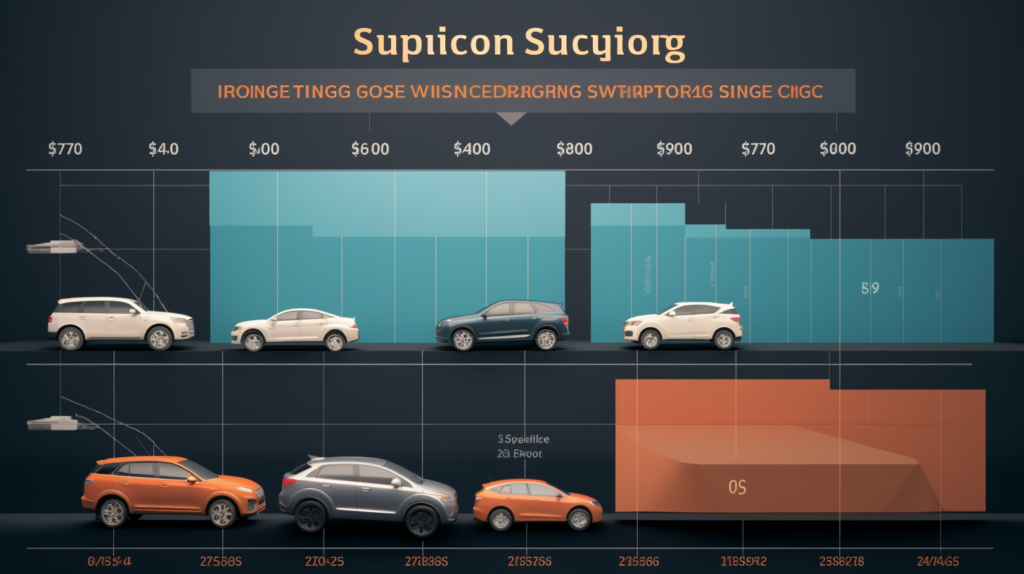
The cost to soundproof a car can vary widely based on the type and size of vehicle. Full size trucks, SUVs and vans will cost more to soundproof than smaller sedans and coupes. Here are some typical price ranges for soundproofing common vehicle types:
Compact Car – $500 to $600 for decent soundproofing. With a small cabin area, compact cars like the Honda Civic or Toyota Corolla don’t require as much material or labor to treat. Focus on the doors, floor, trunk, and firewall for the biggest noise reduction.
Mid-Size Car – $700 to $900 for quality soundproofing. Affordable enough for everyday drivers to consider. Apply damping sheets in the doors, rear deck, roof, and trunk. Use thick barrier mats on the floor and firewall for a 10-15 dB noise decrease.
Full Size Sedan – $900 to $1,200 for a luxury quiet ride. Full size sedans like the Toyota Avalon have large cabin areas that raise material costs. Treat all metal interior panels plus add extra barriers in the rear passenger foot wells.
2-Door Truck – $700 to $900 is common. Regular cab trucks have smaller overall surface area than 4-door models. Treating doors, the cab back wall, floor, and firewall cuts out a lot of road and engine noise.
4-Door Truck – $1,200 to $1,500 provides excellent noise reduction. Crew cab pickups have huge cabin space but also large exposed sheet metal panels. Cover each door, the roof, bed walls and full floor for best results.
Compact SUV – $1,200 to $1,500 due to more cargo space. Applying damping sheets and thick barrier mats throughout the cabin, cargo area, and rear hatch pays off by noticeably cutting road noise.
Full Size SUV – $1,300 to $1,700 makes the cabin feel like a luxury car. Treat sheet metal panels plus add extra coverage in the rear cargo area. Isolating the cabin from the vehicle’s structure is key.
Minivan – $1,300 to $1,700 provides first-class comfort. Minivans require extensive soundproofing to offset the large cabin and huge sliding side doors that increase road noise. Treat every interior panel and seat for amazing noise reduction.
As you can see, larger vehicles tend to cost more to achieve satisfactory soundproofing simply because of increased material needs. Trucks, SUVs, and vans require extra care around cargo areas prone to road noise. But the improved daily experience and reduced driver fatigue is worth the investment.
How Much Does it Cost to Soundproof Specific Parts of a Car?

In some cases, it may make sense to only soundproof certain sections of your vehicle, rather than doing a complete treatment. Areas like doors, rear cargo space, and wheel wells are notorious for allowing significant noise into the cabin. Here are cost estimates for soundproofing specific parts of a car using specialized noise reduction kits:
Doors – $250 to $600 to soundproof a set of doors. Hollow car doors easily transmit noise, but treating them can cut interior sounds by up to 25%. Use self-adhesive damping sheets on outer and inner door metal, plus add fast-curing liquid deadener to seals and edges for maximum noise control.
Roof – $300 to $750 provides noticeable improvements by preventing structural noises from metal vibration and reducing echo. Applying sheets to the roof eliminates rattles, drones, and booming road noise. Use extra damping material on sunroof and moonroof openings.
Trunk – $300 to $450 to quiet a noisy trunk or rear cargo area. Multi-layer barriers installed in trunk floors, side walls, and rear seats prevent road noise from entering the cabin. Treating the trunk often provides the biggest perceived difference in sound levels.
Hood – $200 to $350 to mute engine and exhaust noise. Damping sheets applied to the underside of the hood minimize structural vibrations that amplify powertrain noises. Liquid deadener around latch areas seals out airborne engine sounds trying to escape through gaps.
Firewall – $250 to $400 to block engine noise from entering the cabin. Installing thick sound barrier mats on the engine-side firewall reduces radiated engine noise for a more peaceful ride. For maximum soundproofing, also treat the passenger foot well side.
Floor – $350+ for full vehicle packages that include custom fitted floor mats. Soundproof floor mats use thick rubber bases with vibration damping layers to prevent road noise from vibrating into the cabin. Liquid or spray treatments for wheel wells and undercarriage further block noise.
Wheel Wells – $200 to $250 to prevent tire and road noise from transmitting through hollow wheel wells. A few spray-on noise reduction coats applied inside each wheel well cavity can result in a noticeable reduction in road noise and improved driving experience.
As you can see, targeting a few key areas of noise ingress can be an affordable way to improve interior sound levels without needing to spend on treating the entire vehicle. With some identified problem spots, custom kits make it easy to conveniently soundproof components like doors and trunks.
What Soundproofing Materials and Treatments Are Most Effective?
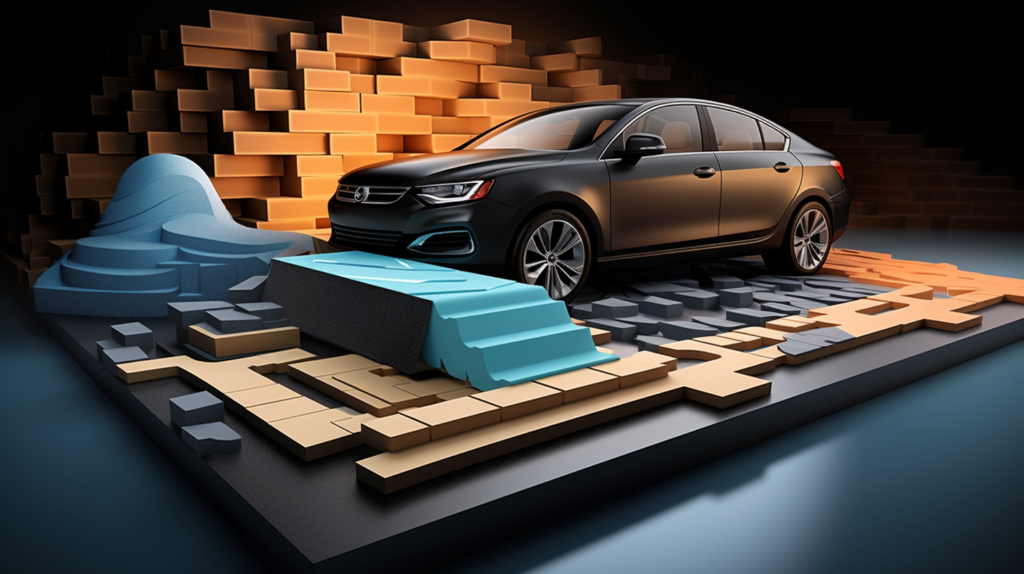
To achieve significant noise reduction when soundproofing your car, you need the right materials and treatments. Two essential components for maximum sound dampening and blocking are:
Sound Deadening Mats – Self-adhesive damping sheets containing layers of butyl, asphalt, and aluminum are specially engineered to stop noise-causing vibrations in car panels, doors, and frames. Top-tier damping mats like Damplifier Pro are optimized for easy DIY installation in your vehicle while offering superior vibration dampening performance. They are applied to any sheet metal surface prone to vibrational noises.
Sound Blocking Barriers – Heavy, dense noise barrier materials similar to mass loaded vinyl are very effective at preventing external noise from entering the vehicle cabin. Luxury Liner Pro is an automotive grade sound barrier with a 1/8″ thick vinyl decoupler layer that excels at blocking noises from roads, engines, wind, and exhaust systems. Full coverage installation of these types of barriers in foot wells, cargo areas, doors, etc can reduce incoming noises by up to 15 decibels.
For even more noise reduction, add Acoustic Foam panels to problematic areas like inner door panels, the rear window shelf, inside trunks, and behind side panels. The foam’s porous open cell structure absorbs sound energy instead of reflecting it, leading to less echo and reverberation that contributes to fatigue on long drives. OverKill Pro and MegaZorbe are quality automotive acoustic foams perfect for targeting specific resonance trouble spots.
When used together as a system, combining vibration damping, airborne sound barriers, and acoustic foam absorption provides the highest levels of noise control – reducing overall interior noise by 10 to 20 dB for a peaceful cabin environment.
What Are the Best DIY Car Soundproofing Kits?
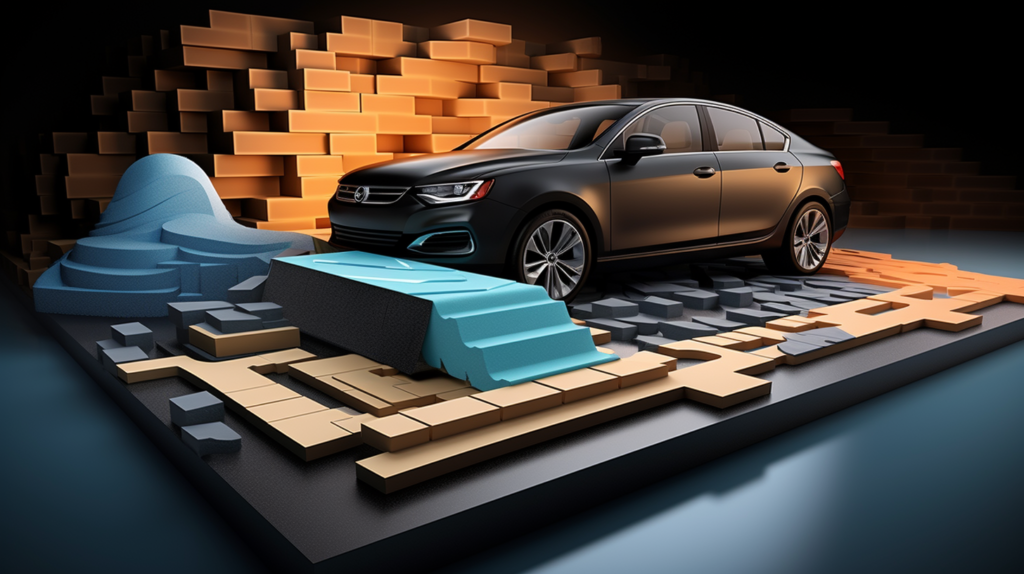
For convenience and cost-savings, complete car soundproofing kits that contain proven combinations of materials tailored for specific vehicles or components are your best bet. These kits eliminate guesswork and provide everything needed for high quality, DIY noise reduction installs with no wasted material.
Vehicle Insulation Packages – For overall soundproofing, packages tailored to your exact car, truck or SUV model provide the right amount of damping mats, barriers, and accessories to treat all necessary areas. With pre-cut kits starting around $500, achieving a 15 dB noise reduction is within most budgets. Upgraded versions with more coverage and thicker barriers are available for extreme noise situations.
Door Soundproofing Kits – Special two-part kits starting at $250 designed just for sealing noises from hollow car doors. Self-adhesive damping sheets cover the outer skin while thick barriers install over inner door panels. Together they prevent noise intrusion through doors by 20-25 dB for ultra quiet rides.
Hood Liner Kits – Affordable $200+ kits include sheets pre-sized for easy DIY application to the underside of your vehicle’s hood or bonnet. Reduces engine noise and vibration transmitted through the firewall for a calmer cabin.
Trunk Noise Reduction Kits – Multi-layer trunk kits starting around $300 transform loud cargo areas into serenely quiet spaces. Barriers cover floor, side walls, and rear seat backs while moisture-resistant damping sheets prep wheels wells and prevent rattling. Rear road noise is reduced substantially.
Floor Mats – Cut-to-fit, heavy-duty soundproof floor mat packages available for $400+ install right over existing mats and use thick noise blocking layers to prevent road vibrations from reaching the cabin. Effectively reduce tire and road noise by up to 18 dB for quieter feet and legs.
The best part is most kits can be ordered with free 1-3 day shipping for fast delivery. And they come backed by lifetime warranties so you know the materials are built to last. Utilizing these purpose-designed kits takes the guesswork out of DIY vehicle soundproofing.
How Many Layers or Products Do You Need for Effective Car Soundproofing?
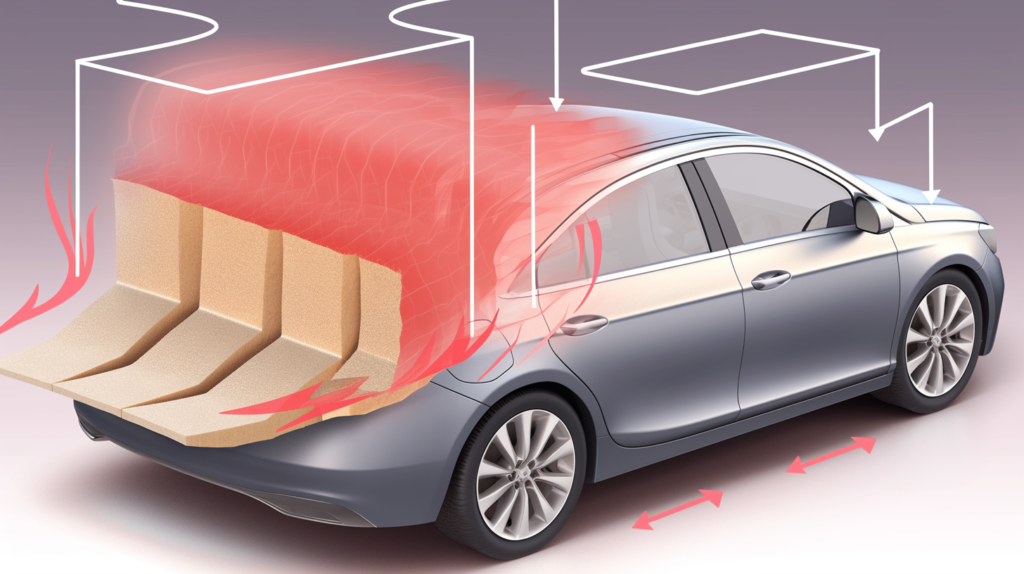
A common question is just how many layers of product it takes to properly soundproof a vehicle. The short answer is that combining 2-3 compatible materials is ideal for blocking noise ingress through different mechanisms. Here is an overview of how the layers work together:
Vibration Damping – Applying self-adhesive sound deadener sheets as the first layer directly on body panels, doors, floors, etc. prevents structural vibrations that cause noise. The sheets bind and dampen the metal, stopping noise at its source.
Sound Blocking – Adding a middle layer of thick, dense sound barrier mats blocks external engine, road, and exhaust noises from entering through panels and openings. This airborne noise reduction is key.
Absorption – Optionally, a final inner layer of acoustic foam panels absorbs noise energy and prevents echo buildup in the cabin that contributes to fatigue. This addresses any remaining reverberation.
So by using products that target vibration dampening, airborne blocking, and echo absorption, you treat all the ways noise impacts the interior sound quality.
Combining just the right materials into a 2-3 layer noise treatment system provides maximum noise control so you can finally experience a peaceful, luxury car ride.
How Long Does it Take to Soundproof a Car?

The time required to soundproof a car depends on the scope of the project, number of layers planned, and your skill level.
Smaller tasks like installing door soundproofing kits or a basic hood liner can each be accomplished in 30 minutes to 2 hours for a DIY novice.
Applying damping sheets in the doors, trunk, or roof can take 2-4 hours for an inexperienced installer but may only require 1-2 hours for someone comfortable working on vehicles.
Completely soundproofing an entire vehicle is best treated as a longer term project that may take 10-25 hours of work overall. Working in stages allows you to spread the effort over multiple sessions.
Prioritize problem areas first before moving on to less bothersome panels.
Many people report that after soundproofing the doors, trunk, floor, and firewall of their car over a few weekends, the improvement was so dramatic that they didn’t feel the need or urgency to treat remaining areas.
The good news is that the time investment is well worth the elimination of fatigue, headaches, and stress caused by loud cabin noise in most vehicles.
And as your installation skills improve, you can expect each subsequent round of soundproofing treatments to go faster.
With the right materials and some perseverance, you can achieve the quiet ride you’ve been dreaming of.
How Long Will Car Soundproofing Last?
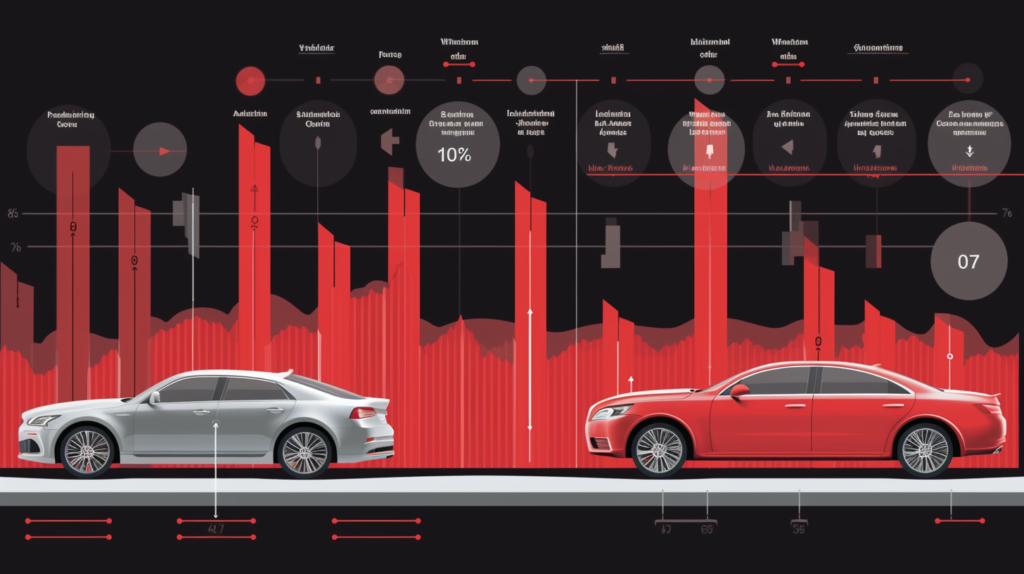
Quality soundproofing products like vibration damping sheets and sound blocking barriers are engineered to be long lasting install-it-and-forget-it improvements for your vehicle.
3M, one of the industry leaders in automotive noise damping technology, formulates their products to maintain noise reduction performance for the expected life of the vehicle when properly installed.
Butchering the job by improperly preparing surfaces, failing to use primers, or applying inadequate pressure during installation can negatively impact adhesion and durability.
Sticking to manufacturer guidelines and installation best practices is key.
Taking time to do careful surface prep and using automotive grade materials suitable for survival in tough under-hood or wheel well conditions ensures maximum longevity.
DIYers using top tier damping products report still noticing effective noise reduction 5-10 years after installing sound deadener sheets and barriers in their vehicles.
Even after the car has 60,000+ miles on it, the noise control improvements persist thanks to quality materials. With care taken during application, soundproofing truly can be a set-it-and-forget-it upgrade.
Is Professional Installation Recommended?

One of the best things about quality car soundproofing kits is that they are intentionally designed for DIY installation by regular drivers, not just professionals.
The materials included are specifically chosen because they allow novices to achieve great noise reduction results with simple tools and techniques.
Damping sheets come with self-adhesive backing for easy peel and stick application. Barrier mats are very forgiving and simple to cut and fit into place.
Clear instructions and online installation guides walk you through each step of the process at your own pace.
While professional installation is always an option for those not wanting to DIY, it also comes with added labor costs.
In many cases, you can achieve the same great noise reduction just by taking your time to carefully install the materials yourself. Patience and following directions pays off.
Conclusion
For some, having pros handle more complex treatments like sealing floor pans or applying specialty liquid deadeners may be worthwhile for sections you’re unsure of.
But don’t be intimidated thinking you have to be an auto mechanic or audio specialist to effectively soundproof your car on your own.
These kits put quality noise control in the hands of everyday drivers.
Improving your car’s noise levels with sound damping and blocking can make driving much more peaceful and comfortable.
While fully soundproofing a vehicle can cost $1,000+ in materials, noticeable improvements are possible within most budgets.
Understanding the main noise sources and types in your car guides which parts may need treatment first.
Investing in quality kits with proven noise blocking performance also makes project success much more likely compared to buying random materials.
With some free weekends and willingness to learn, transforming your car into a serene cabin free of road noise, rattles, and engine drone is very DIY friendly. Don’t settle for fatigue and headaches.
Your quiet ride awaits!
